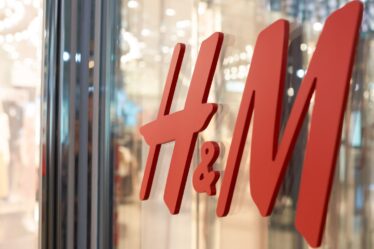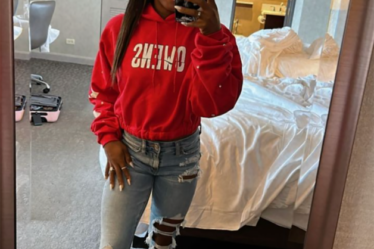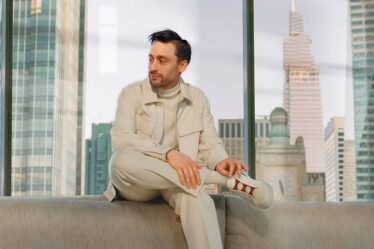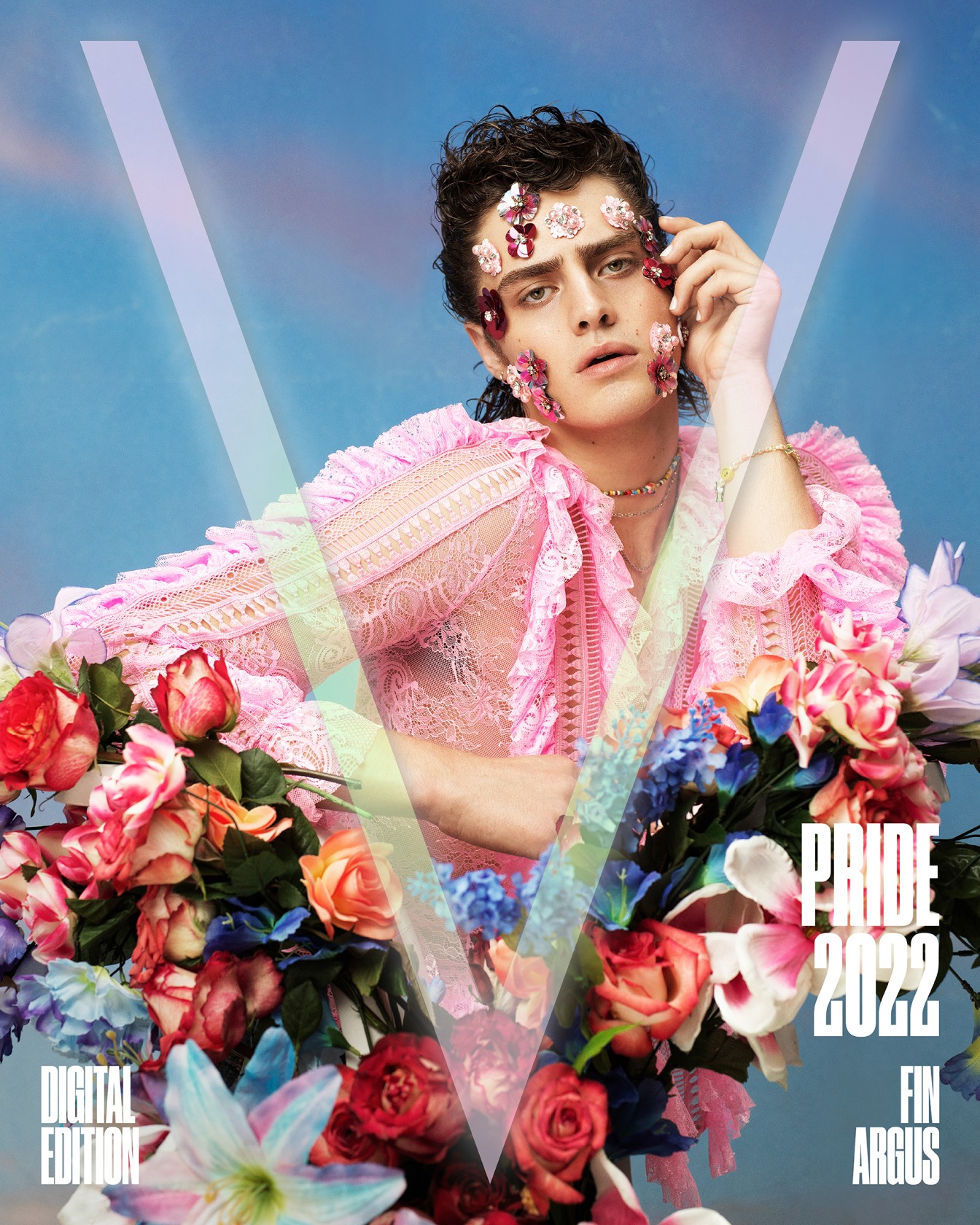
In Latin, fin means end. In Hollywood, Fin is just the beginning.
Fin Argus is the apotheosis of the 21st century creative, the always-creating, never-conforming, do-it-all artist incarnate. It’s impossible to tell where Fin the Actor ends and Fin the Musician begins, to separate the skater from the writer, the Bowie enthusiast from the figure hopping on a board in one Instagram photo and lazing on a picnic blanket in a yellow midi dress in the next. They are a balancing act of expression, an unfiltered raconteur in a vision of a fearlessly queer industry; if you’ve learned to subvert your expectations in an increasingly Gen-Z-ified Hollywood, then they’re exactly what you’d expect. Off-screen, Fin Argus might be attending a queer skate meet-up, or writing about their experiences coming out as a teen in Los Angeles, or immersed in nature, or listening to Phoebe Bridgers and Vampire Weekend. On-screen, Fin Argus seamlessly melds into whichever character they are playing, whether a high schooler battling cancer à la their acclaimed 2020 film Clouds or an aspiring drag queen à la their character Mingus on Queer As Folk, the rebooted Peacock series Argus triumphs in.
“To be given the opportunity to be myself […] and to actually play a character that’s so unapologetically queer and passionate about expressing themselves through the art form of drag, it broke something open in me,” says Argus about Queer As Folk. “I didn’t realize that I was holding my breath.” An exhale, a breath of fresh air; it wouldn’t be remiss to compare the liberating effect of Mingus on Fin Argus to the liberating effect of Fin Argus on the entertainment sphere. There is something deeply honest and raw in Argus’ expression, an unfiltered (and undeniable) talent delivered from their unique lens, an identity that is “not just a part of [them] that [they] can put aside to play a character,” but instead, an asset, a part of them that “informs every character that [they] play and makes [them] a better actor.” There’s a new regime on the horizon; Argus is the proof. Below, the actor reflects on identity and Pride, and talks their experiences on Queer As Folk, the changing landscape of skate culture, and their upcoming music.
Fin wears top Blumarine / Fin’s personal jewelry
V MAGAZINE: Hi, Fin! How are you?
FIN ARGUS: I’m having a really solid…what is it, Thursday?
V: It’s Friday.
FA: Oh my God, Friday! Even better. Thank God.
V: I love that you thought it was Thursday, though. The summer days are flying by, huh?
FA: I know. How’s your Friday going?
V: Honestly, also really solid. I’m streaming a new series on Prime that just dropped, would recommend so far.
FA: Wait, what’s it called?
V: It’s The Summer I Turned Pretty. Just a really cute, summertime vibe.
FA: I’m obsessed. Added to my watchlist.
V: Yeah! What are you up to this Friday?
FA: I just had a little picnic in a park somewhere in San Francisco, I think it was called Dolores Park. Now I’m back in my hotel just chilling.
V: Amazing. I don’t know how San Francisco celebrates, but we’re about halfway through June now, and at least here in New York, Pride celebrations are already in full swing. Are you doing anything fun for Pride month? How are you celebrating?
FA: Honestly, I haven’t really gone out or done anything for Pride yet besides just hanging out with my friends who all just happen to be queer as well. So I don’t know…life is a Pride party! I haven’t gone to any parades or anything yet, I just keep on missing them. I’m always out of town. When LA Pride was happening, I was in New York. When New York Pride was happening, I was in LA. San Francisco Pride happens next weekend and I’ll be back in LA, so I’m just missing everything. Pride is where the heart is, you know what I’m saying?
V: Totally. My friends and I have that mindset too, especially when everyone is traveling in summer. Every day can be Pride Month!
FA: Literally.
V: What does Pride mean to you?
FA: It means being relaxed into my queerness with other people. Pride to me means a sense of community.
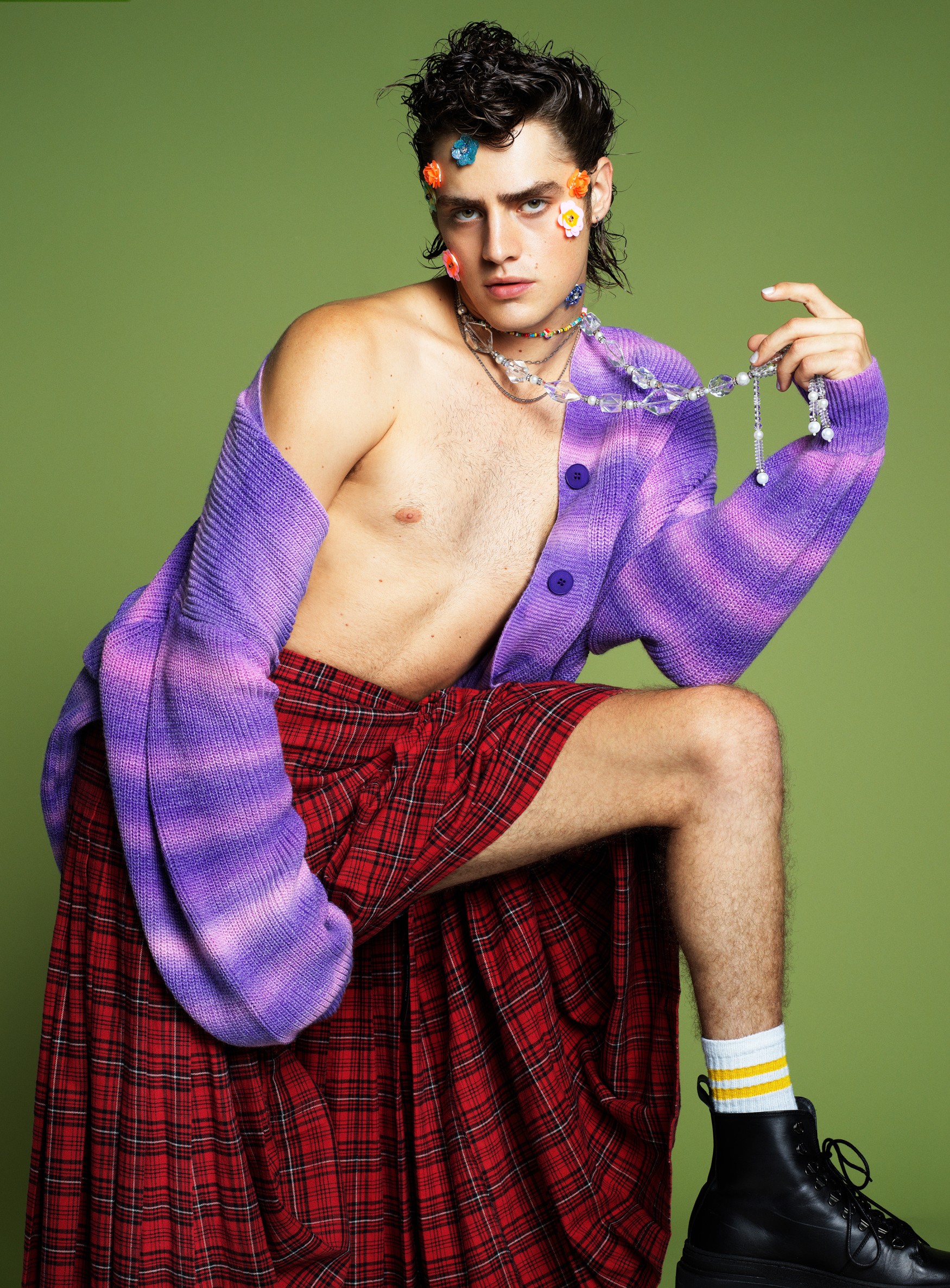
Fin wears sweater 8 by Yoox / necklace Lidow archive, and Fin’s own / skirt Celine by Hedi Slimane / boots 8 by Yoox / socks, Fin’s own
V: I read in an interview of yours that David Bowie is one of your major icons, which, same. But you’re also releasing some new music soon—can you tell me about that? Is it Bowie-esque at all, what can we expect there?
FA: You know, I would say that there are some homages to Bowie’s performance style. Musically, it’s very indie rock, and I guess it’s also similar to Bowie in that way where I take a lot of inspiration from outlandish metaphors or analogies and turn them into songs. I really like the way that he told stories, but the new music that I’m making is definitely a lot different than what I’ve put out before in the sense that my old music was very fantasy-based, and it was almost as if I was telling a fantasy story based on characters. What I’m doing now is sort of melding the worlds between metaphors and harsh realism. I’m just trying to incorporate more of my own life experiences into my lyrics. And a large way I’m doing that is just being a lot more explicit about my queerness when it comes to my gender and the people that I love. And so this new music is about the pressure to present a certain way. It’s also about the liberation of being exactly who I am for no one other than myself.
V: That sounds amazing. I cannot wait to hear it.
FA: I’m excited to put it out.
V: What or who would you say are some of the biggest influences on your sound, as well as your creation and your art in general?
FA: I would say that, with where I’m at right now with music, the closest reference points I can think of are Tune-Yards and Vampire Weekend. It’s sort of like if Tune-Yards and Vampire Weekend had a gay baby, I am that gay baby, crying with a ukulele in my hand.
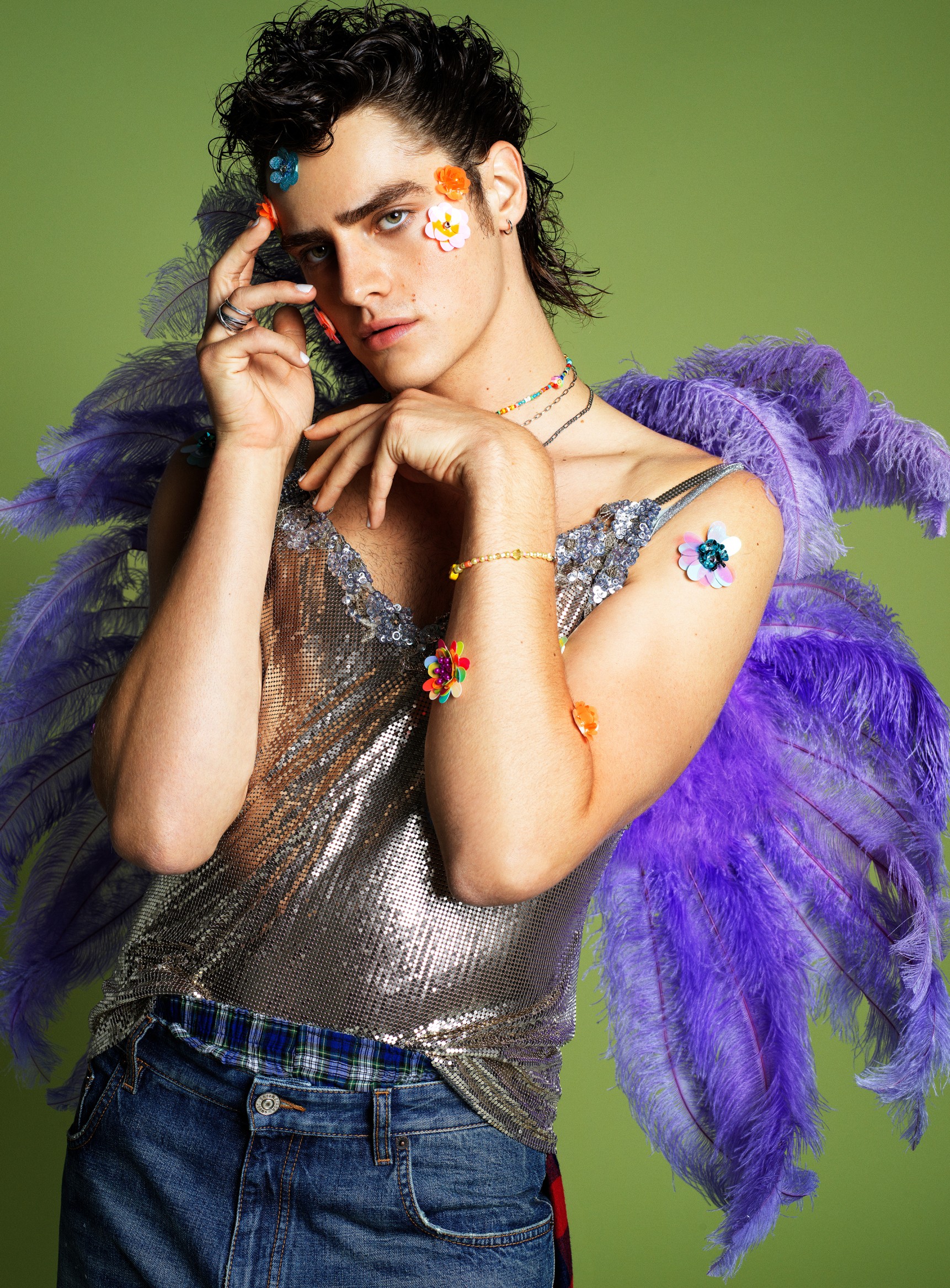
Fin wears pants and top Balenciaga / top Balenciaga / wings Lidow archive / jewelry Fin’s own
V: That’s awesome. How has your identity as an actor, a musician, a member of the LGBTQIA+ community all shaped your artistry and your expression?
FA: I moved into Laurel Canyon about four and a half years ago. If you’re not familiar, it’s a place filled with so much music history, and I was close to Jim Morrison’s old house. There are a lot of iconic bodies of music that have come from there, like Joni Mitchell lived there, so did The Beach Boys…the list goes on, but I moved in there and I don’t know what happened, but something took over me and I felt so inspired to write music that was explicitly and authentically myself. I’ve never been more proud of the music that I’ve made than in the last four years, and especially within the last couple years, as I’ve recorded and really honed in on my new sound. I just feel like I’ve been in a creative vortex. I’ve been inspired by a lot of those musicians, like The Beach Boys and Joni Mitchell and the way that she tells stories. And when it comes to modern musicians, it’s kind of like Phoebe Bridgers. That’s actually probably the closest reference point to the stuff I’m writing right now.
V: Totally. Are you seeing her on tour?
FA: I wish! Oh my God, I really want to. It’s not too late. I’m going to try to make it happen, because I’m obsessed with her. I think she’s so cool.
V: Yeah, definitely just go try to rush the barricades or something. Do what you have to do.
FA: Yeah. I am going to see MUNA in October, though, which I’m very excited about.
V: Oh, fun! They both just played a show in Queens the other night, I was so upset I couldn’t go.
FA: Oh my God, “Silk Chiffon.” That song…
V: That song specifically live?
FA: So good.
V: So good!
FA: I really want to see that live. I’m gonna cry, I’m hopefully gonna kiss a cute boy.
V: I’m manifesting that for you. I think that you can achieve that.
FA: Right?
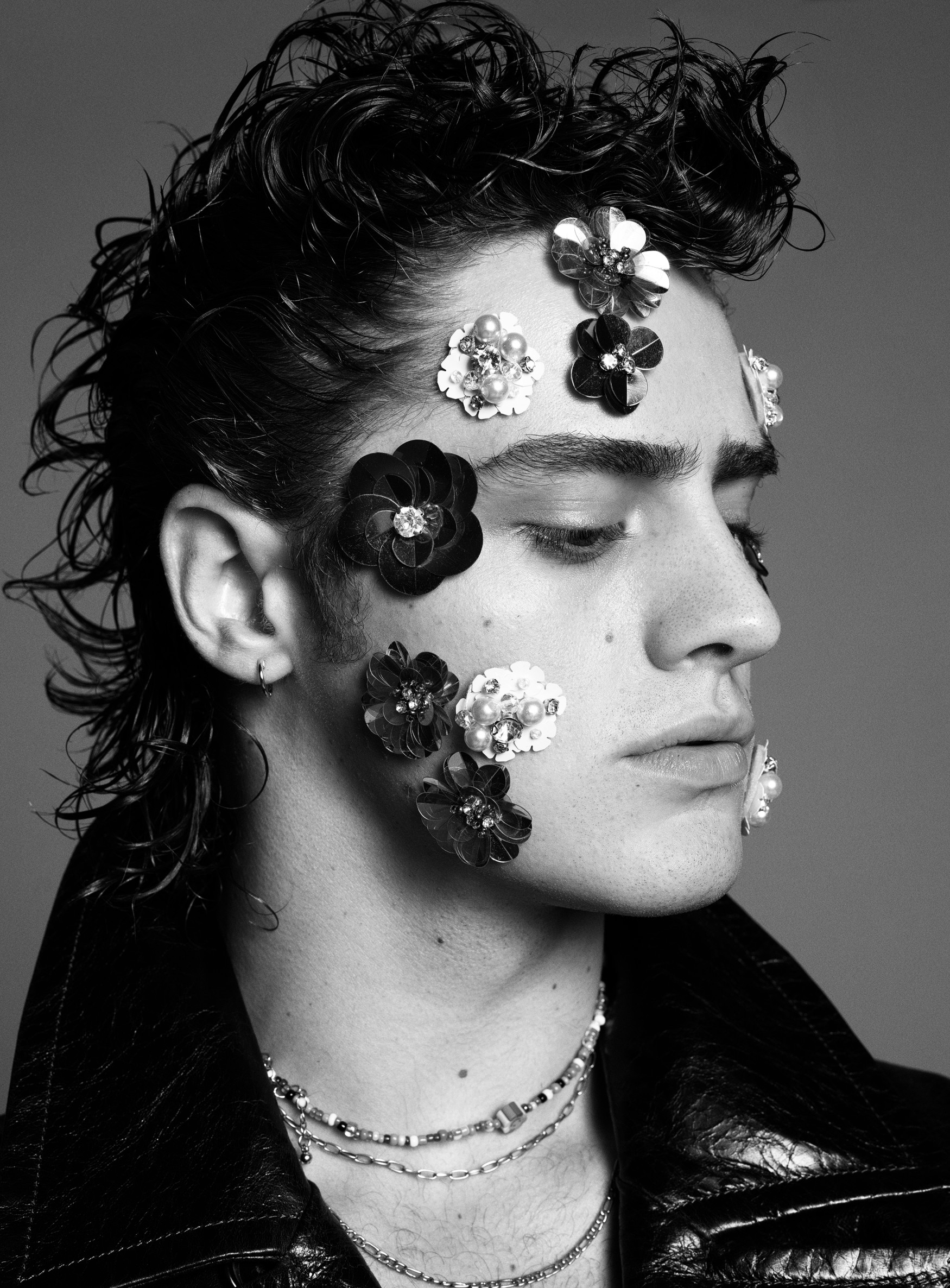
Fin wears jacket Ann Demeulemeester / jewlery Fin’s own
V: So, to pivot a little bit, I’ve seen scattered throughout your Instagram that you’re into skating?
FA: I love skating.
V: What kickstarted that interest for you?
FA: I’ve been skating my whole life. It started off more as longboarding. I was just cruising around the city and I grew up in a town where it was really easy to skate everywhere. It was a very flat land with a bunch of smooth streets, so I grew up skating to get everywhere I needed to go. But within the last couple years, once lockdown was lifting, I was seeing posts about this queer skate meet-up that happens at Chevy Chase in the Glendale area in LA. I was just so interested because I’ve always wanted to go to a skate park and try to learn how to ride on the ramps and do tricks and stuff, but it’s a very machismo environment a lot of the time. So I had a hard time bringing myself to go there, especially on my own. It’s just intimidating, but when I saw that they were doing this queer skate meet-up, I was like, yes, yes, yes. I absolutely want to go. I went and had the best time. They were so welcoming, everyone would ask for pronouns. Everyone had name tags with their pronouns on them. And everyone was super respectful and encouraging. and I’ve never improved so fast in my life at skating. And it really has to do with that support and encouragement. It pushes everyone to try new things and not be afraid to mess up, which is how you get good at skating. Since then I’ve become part of a few different queer skate meet-ups, and it’s just so much fun. There’s even this queer skate group called Bottom Feeder, and they do skate videos in drag sometimes, which I think is cool.
V: I think I saw on your Instagram a video of you skating in a yellow skirt, or a pink skirt one time. And I was like, this has to be the new skate look. Out with the baggy jeans and in with the mini skirts.
FA: It is! There’s this whole wave of queerness in the skate scene and I’m loving seeing it, and drag as well. I love watching those worlds melt together.
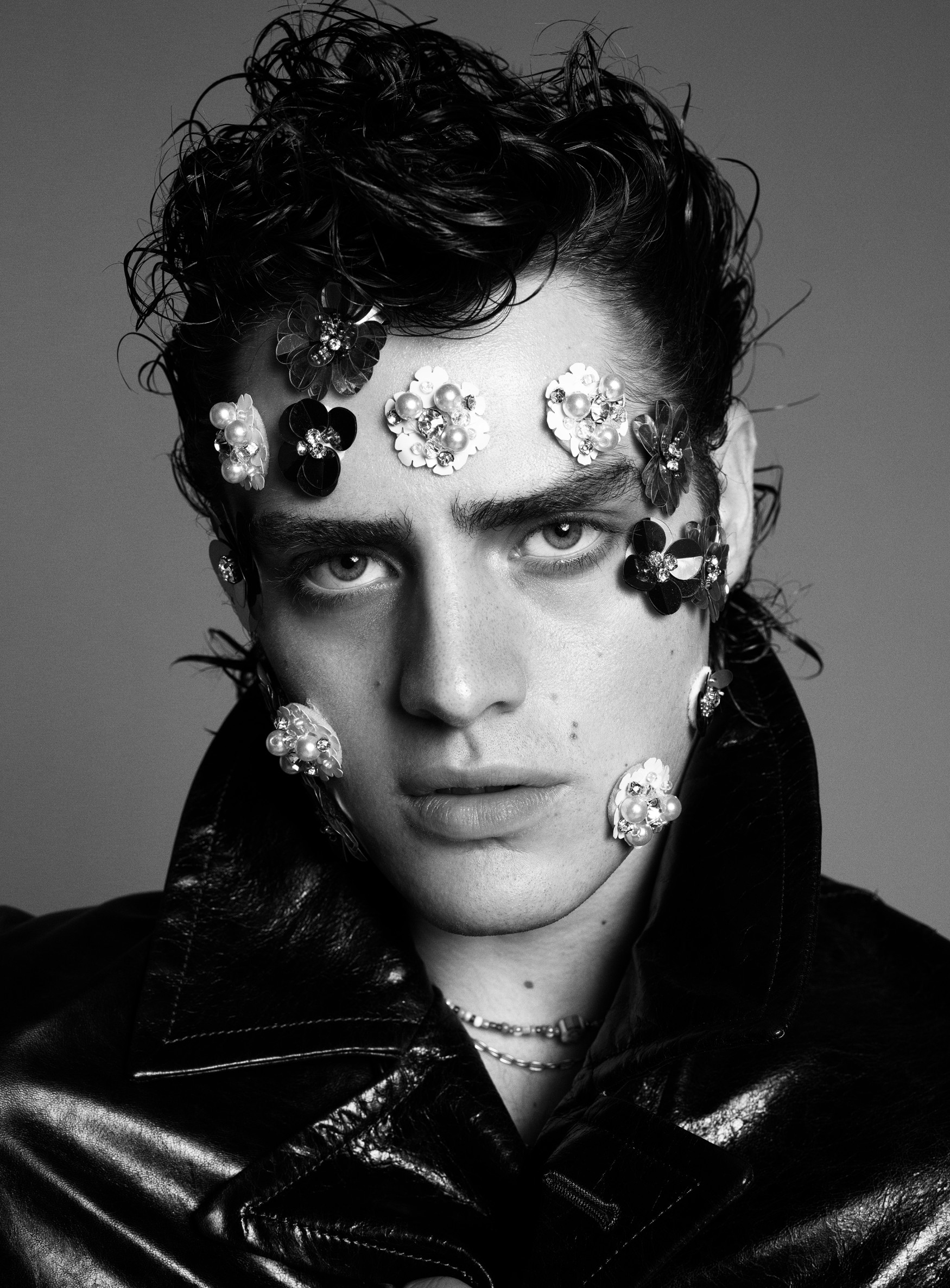
Fin wears jacket Ann Demeulemeester / jewlery Fin’s own
V: For sure. So, let’s talk TV. Queer as Folk is your first time playing a queer character…how has this experience been for you? Does it feel particularly daunting or liberating?
FA: It’s liberating. From a personal standpoint and also just a career standpoint, I feel like I’ve spent so much time pretending to be the characters that I play, and I’ve always played this very straight boy-next-door-type character, which I know I can do and I know I’m good at because I’ve been doing it for years. I was closeted as a kid for so long, you know? But to be given the opportunity to be myself—and I’ve been out for a while now—and to actually play a character that’s so unapologetically queer and passionate about expressing themselves through the art form of drag, it broke something open in me.
I didn’t realize that I was holding my breath. I didn’t realize that when I was going onto these sets and in these work environments that I didn’t feel fully safe or comfortable to be myself. Because queerness isn’t always seen as an asset, whereas I know it is. My queerness is what allows me to be in touch with my emotions and allows me to be the actor that I am. It’s not just a part of me that I can put aside to play a character, it’s a part of me that informs every character that I play and makes me a better actor. To go on this set where my queerness was not only accepted, but it was encouraged and it was actively seen and referred to as an asset was something I never thought I’d experience. And it made that whole experience incredibly gratifying and humbling and exciting and also scary. but I’ve never felt more supported on a set in my queerness before, and to work with so many talented queer folks and really see us all thrive and do our job well, it was just so exciting.
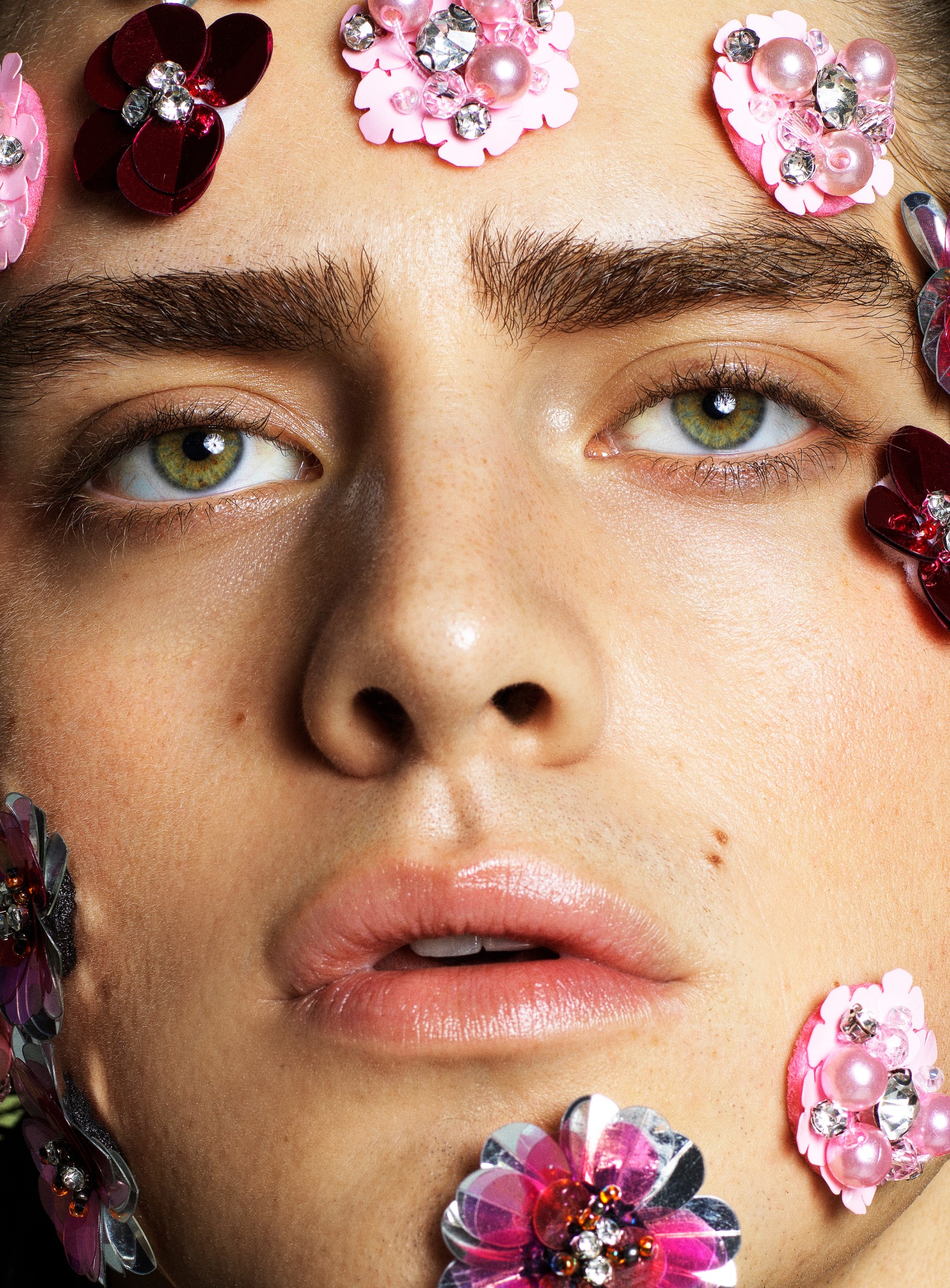
V: That’s wonderful. It sounds like just a really beautiful work environment to be in. Are there any particular practices or anything you do on set to get into character for Mingus?
FA: Something that I do for pretty much all the characters I play is create a playlist. I have a whole playlist on Spotify that is built of songs that reminded me of Mingus, and whenever I was getting on set, I would play that playlist. I’d get into the mindset, get into the angst—because Mingus is a lot angstier than I am, and it makes sense, she’s 17, she’s still figuring things out, but I was listening to a lot of pop punk.
V: Who wasn’t, at 17? Representation is always something that is brought up when it comes to actors, and seeing someone on the screen who is a part of your community. What advice would you give to someone in the LGBTQIA+ community who is just starting their acting career or hoping to break into the industry?
FA: I would say believe and know that queerness is a part of you that is an asset, and it is a part of you that makes you special, and never dim your light to fit into any role. Acting is stepping into different characters and getting into these new headspaces that can be so different from who you are, but being in touch with yourself and being comfortable with that truth is what allows you to tell other stories in an honest and authentic way. So never turn off your truth. That’s what makes your acting interesting.
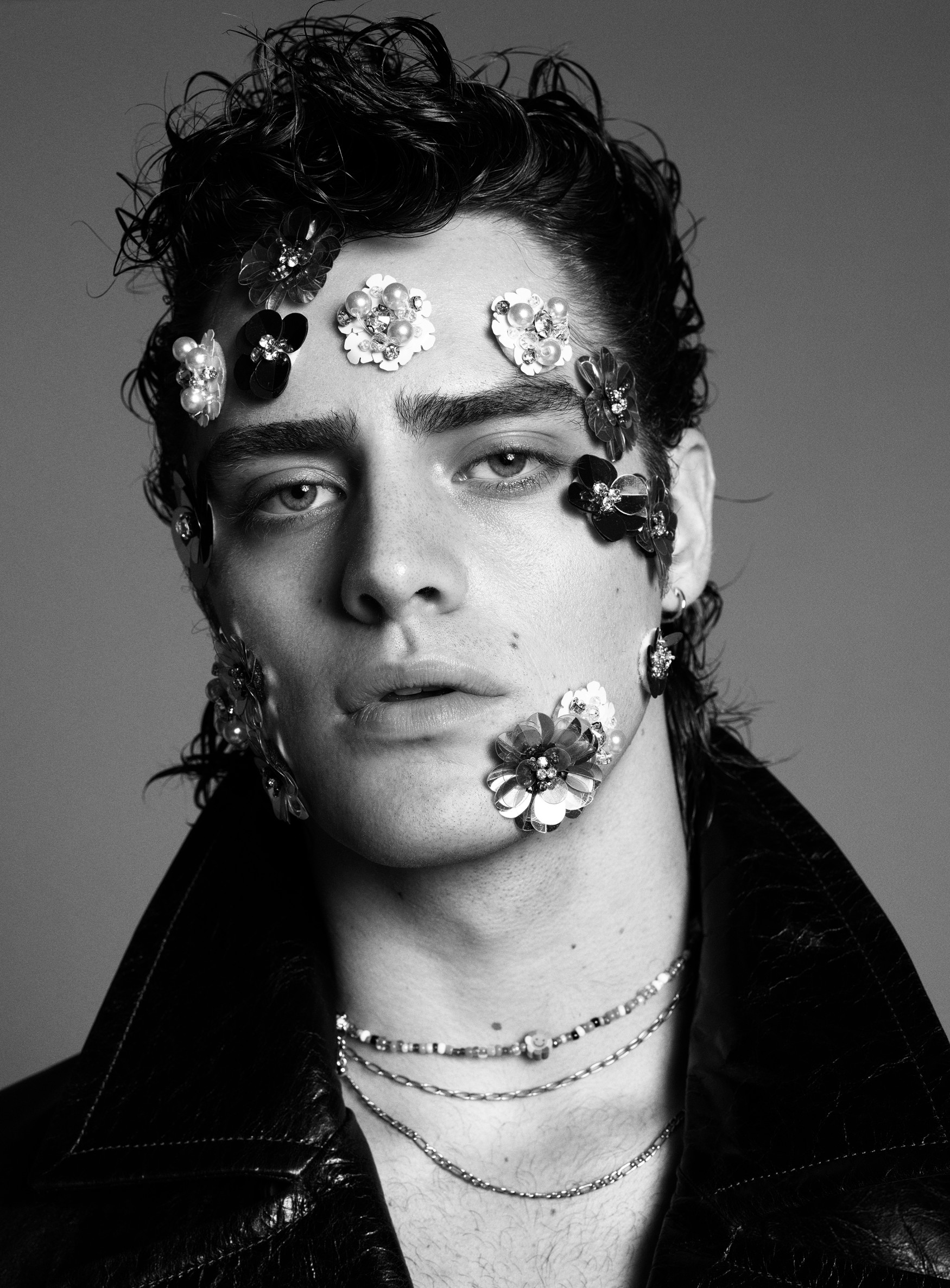
Fin wears jacket Ann Demeulemeester / jewlery Fin’s own
V: As a creative, what keeps you inspired when you feel like you’re in a rut?
FA: Huh. I don’t know. You know, it’s been tough lately, especially after lockdown. I feel like I was really struggling to be creative, and the thing that usually would inform my writing is real life experiences and nuanced relationship dynamics. And now that things have been opening back up, I’ve found myself overwhelmed with things to write about, but when I was in that place where I had nothing to do but take inspiration from my mental struggles, I was writing more about feeling trapped and isolated, but I was struggling to write at all. The thing that always gets me out of a rut like that is just going into nature and being alone. Maybe not even writing a song, but just writing freeform, just putting a pencil to paper and letting my thoughts out, because sometimes there can be traffic jams of thoughts and creativity.
And when there’s so many thoughts that are swirling around in your head, especially if you’re distracted or preoccupied by external circumstances, sometimes the best thing you can do is just write anything. It doesn’t have to be good. It doesn’t have to be creative. Just start writing. Write the things that are around you in your room, try to figure out what you’re feeling by writing it down on a piece of paper. A lot of the times for me, that helps break something open and it helps me get back into a sort of flow of creativity, but it’s hard. It doesn’t always work, but the only thing that I’ve found is just spending some time in nature and trying to write literally anything with no expectations.
V: I couldn’t agree more. Picking up the pen is always the hardest part of writing. I have one last question for you: what’s coming for you this year? What can we expect from you next?
FA: I’ve got a song and music video coming out very soon, which I am so thrilled about. This is a real passion project. It’s a song called “Exposure,” and its tongue-in-cheek commentary on social media and the pressure to make content and sell yourself as a product. I felt that my whole life; I started acting when I was 12, so I’ve always felt the line between self and product marketing has gotten very blurry, and that’s a confusing thing to grapple with. So I wrote this song that sort of helped me figure out how I was feeling about it. I think a lot of people will relate to it.
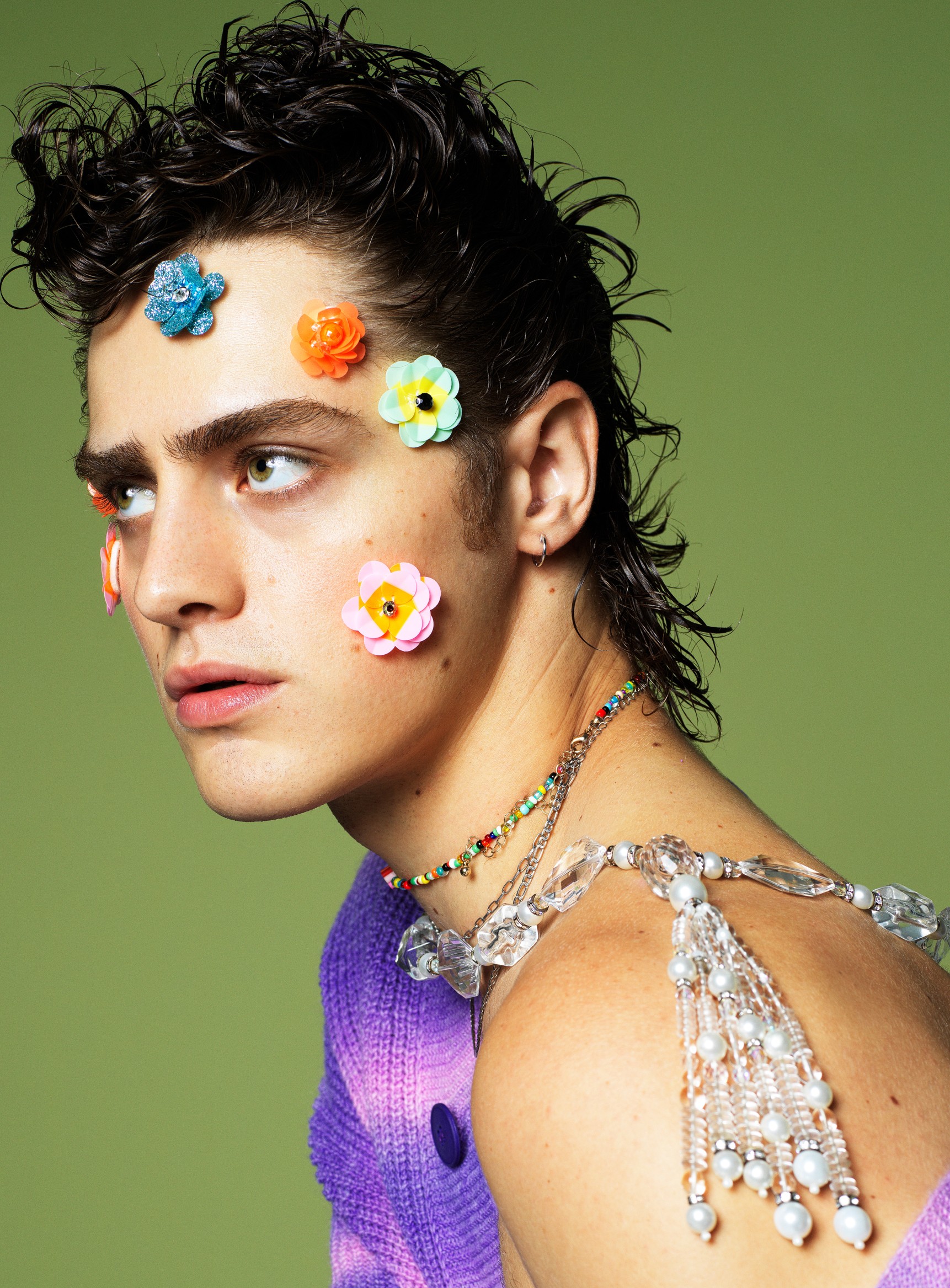
Fin wears sweater 8 by Yoox / necklace Lidow archive, and Fin’s own
I also made a music video with a director and DP named Ramón J. Goñi. He’s an incredibly talented, creative visionary, and the music video is actually the thing that I would say reminds me most of David Bowie. Less the music, but the music video has this sense of an almost drag performance that Bowie gets into, and it’s very sci-fi, very beautiful. I’m so proud of it. And we made it independently. I don’t have a label, so this has really just been a passion project that we’ve put our hearts and soul into. I couldn’t be more proud of what we’ve accomplished, and I think people are really going to resonate with what we made. So I’m thrilled to release it and start doing shows with my live band again. That’ll just be the start of this new music era, and I intend on releasing an EP later this year. It’s sort of this West Coast, queer, coming-of-age story based on my true life experience of coming of age and coming out in LA. It’s vague, but I’m just so proud of the writing that I’ve been doing, and I can’t wait to share it with everyone.
Credits: FASHION DIRECTION NICOLA FORMICHETTI, FASHION COORDINATOR HUNTER CLEM, STYLIST ASSISTANT COLE DIJIACT, HAIRSTYLIST JOERI ROUFFA, MAKEUP ARTIST LISELOTTE VAN SAARLOOS, MAKEUP ARTIST ASSISTANT MILA KWAN, EXECUTIVE PRODUCER JOHNNY PASCUCCI, SR. PRODUCER SARA BIELECKI, PRODUCTION COORDINATOR VICENTE LUNA, KEY PRODUCTION OMAR QUIROGA, SET DESIGNER ENOCH CHOI, SET DESIGNER ASSISTANT DEBORAH CHECK, LOCATION DUST STUDIOS

